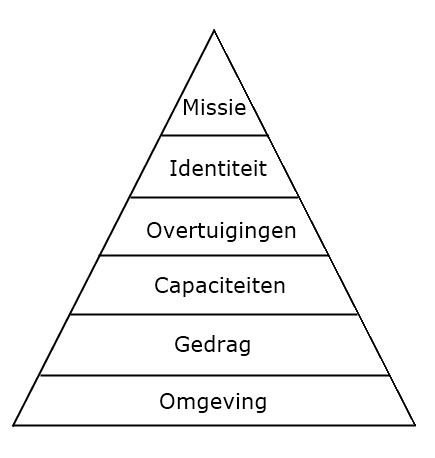How to become your own life coach
Not infrequently, life goals are not achieved because of one's own pattern of thoughts or behaviour. Sometimes without being aware of this ourselves.
The starting point of progress is the three simple questions:
- who am I?
- what do I want?
- what can I do?
Remarkably, not everyone knows how to answer these questions for themselves. The fact that someone does not know this already exposes a large part of the problem. Because how can you move forward if you don't know where you want to go?
My goal as a life coach is always: to discover my client's goal and work towards it together, step by step.
It is even possible to be your own coach using the tools below. I am going to teach you how. During my consultations in the salon, I use Bateson's logic levels.
Bateson's logic levels is a pyramid designed by Gregory Bateson and Robert Dilts with the premise: everyone can achieve their life goals by removing the obstacles they encounter on their way to success.
You can also consult this pyramid yourself at home.
Bateson's pyramid
Do you feel like you are standing still? Would you like to move forward but don't know how? To find out where your personal obstacles are, climb an imaginary pyramid consisting of six levels.
It may be that you already know yourself why you are not making progress, but do not know how to change this. It may also be that you know you are standing still, but have no idea what is causing this.
In either case, the pyramid is useful and you can ask yourself the same questions that a life coach would...
- Surroundings
- Behaviour
- Qualities (capabilities, ability, knowledge)
- Beliefs and values (truths)
- Id.
- Meaningfulness (purpose, mission, spirituality)

Becoming your own life coach!
Step by step, climb the pyramid yourself and give yourself honest answers to the following questions.
1. Environment
You start at the bottom of the pyramid with the environment. Even if your intentions are good, your environment can be a real obstacle. Your partner, your children, your parents, your family, friends, neighbours, colleagues, etc .
Questions: what do you respond to, what affects you?
Write down the answers.
Deepening: how can you break this pattern?
Write down everything that comes to mind right now. Even the answer that you know would be good for you but which you actually don't dare or don't want or can't do for other reasons.
2. Behaviour
Actions and reactions. What do you do, how do you react in certain situations, how do you behave towards your environment, both verbally and non-verbally.
Questions: what am I doing, how am I acting, what is my behaviour and is it or is it not observable by the environment?
Write down the answers.
Deepening: what do you want, can and need to change about this to achieve your goals?
Write down everything that comes to mind right now. Even the answer that you know would be good for you but which you actually don't dare or don't want or can't do for other reasons.
3. Qualities
Your knowledge, talents, insights, qualities and skills.
Questions: What knowledge do you have, what talent do you have, what can you do and how does your innate talent match your learned skills? Do you do something you are good at or enjoy doing?
Write down the answers.
Deepening: How do you combine knowledge, talent and skill in the right way so that you can use it all in the right way to achieve your goals?
Write down everything that comes to mind right now. Even the answer that you know would be good for you but which you actually don't dare or don't want or can't do for other reasons.
4. Beliefs and values
Your inner drives, norms, values, (pre)judgements and expectations. What is learned, instilled, what comes from yourself and what experiences have brought this about?
Questions: why do you want it, why are you doing it, what is important to you, what do you care about?
Write down the answers.
Deepening: which beliefs, norms and values work in your favour or against you in achieving your goals?
Write down everything that comes to mind right now. Not just the positive things but certainly also the answer that you know will be difficult to let go of this thought pattern or belief.
5. Id.
Self-image, self-esteem and self-worth. How do you think about yourself, how do you see yourself, how do you want others to see you and how important is this to you.
Questions: who are you, why do you see yourself this way, how did you become this way, why is it important to you why others see you a certain way?
Write down the answers.
Deepening: to what extent can and do you dare to be or become yourself and to what extent does this contribute to achieving your goals?
Write down everything that comes to mind right now. Even if it's an answer you don't actually like.
6. Meaning
Here we come to your own spirituality. The meaning of your existence. What are you actually doing it all for, what is the highest possible thing you can and want to achieve.
Questions: what really gives meaning to your existence, what could make you experience (more) inner peace, what would make you happy, what would make you physically and mentally more balanced, what do you understand by happiness and wealth?
Write down the answers.
Deepening: what will you need to do and, more importantly, abandon to experience the highest level of happiness and achieve your goals?
Write down everything that comes to mind right now. Even the answer that you know would be good for you but which you actually don't dare or don't want or can't do for other reasons.
When you have written down all the answers to the questions, you will notice that now that you have everything in black and white, a pattern of your own behavioural and thinking patterns will become visible, making it clear what is holding you back in your progress and personal growth.
With this self-insight gained, you can now work as your own life coach by clearing every obstacle, every hurdle and tackling every problem (self-created or otherwise) at its root.
Make a list on which you write down the problems to be tackled in order of importance. Write what you want to solve first at the bottom, the last at the top. In this way, work from the bottom to the top.
What is also a fine method is to sort the problems by difficulty. So whatever you find easiest to solve at the bottom, the most difficult at the top.
Whatever order you choose, this way you create overview and at the same time your own roadmap. Working on one problem at a time also increases your chances of success.
Each time you have overcome a problem, tick it off your list; on to the next challenge! Just until you have overcome every hurdle, cleared every obstacle and achieved your goals.
A handy help in explaining your own dreams is the book: Reset your mindset (self-help book, written by mental coach Daan Jensen).
Psyche blog >HOME


